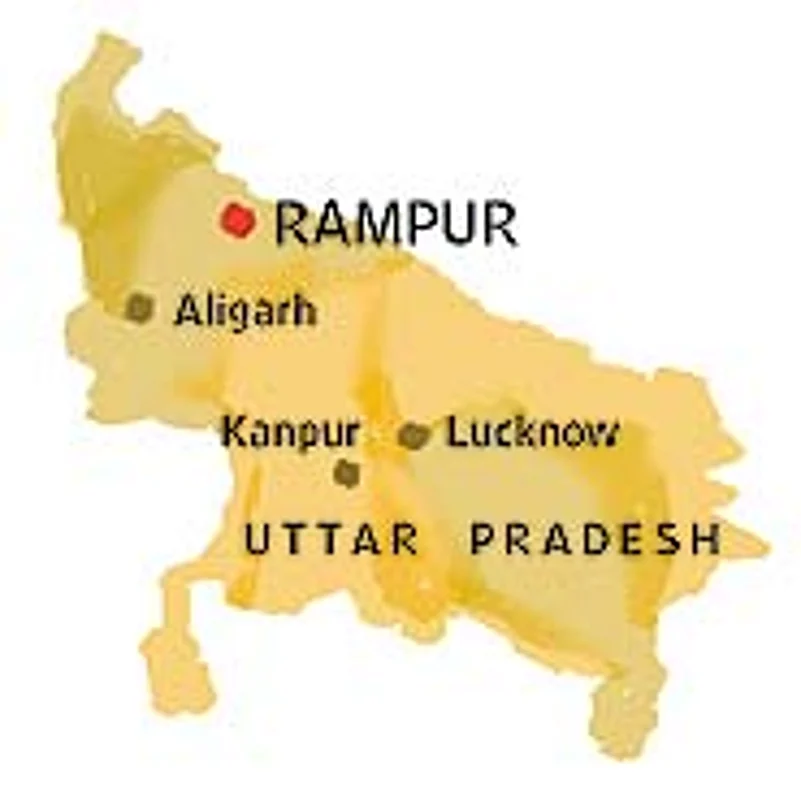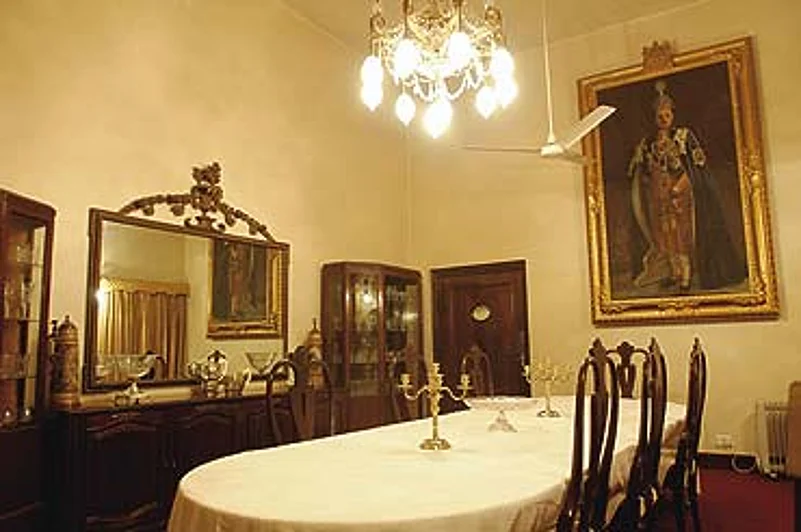
On the walls, blonde nymphs frolic across impossibly idealised European landscapes. The blue-and-gold ceiling is peeling; the Osler chandeliers are laden with dust. These—and the ghosts of the past—are all that remain of the once-grand banquet hall at the Khas Bagh Palace, the seat of the nawabs of Rampur.
The Wedgwood china, crystal and silver have long vanished. So has the long damask-shrouded table, which could seat as many as 500 guests. So have the liveried attendants who stood behind each chair. And so have the 300 cooks, each a specialist.... The glory days of the former nawabs, Hamid Ali Khan and his son Raza Ali Khan, who died in 1966, are now a distant memory.
And a glimmer in the eyes of Hamid Ali's grandsons, Sualeh Ali Khan and Jaffar Ali Khan, who shared many memorable meals with their maternal uncle, Raza Ali, at a table groaning under the weight of Rampuri specialities. There was the partridge biryani, where each guest got an entire bird; the shabdeg, meat cooked all night with turnip, and the magical desserts that looked like real oranges (naanenarangi) and grapes (naaneangoor).
Sualeh Ali walks us through the empty, echoing corridors of the palace, stripped and bare—and now locked and barred as it is the subject of a legal dispute in the Rampur family—recreating the past with words. As he talks, I can almost hear the buzz of conversation and the tinkle of forks and knives—for the food, even if Indian, was always served western style—and taste the fragrant biryanis, melt-in-the-mouth kababs, the rich kalias, kormas, saalans.
Perhaps even a light-as-air souffle, for Hamid Ali, a gourmet with eclectic tastes, sent a succession of royal chefs to train for a year in Paris. They returned not just with new skills but a brand new family name: Monsieur, a name their descendants still cling to!
Cut to the old city in present-day Rampur: walk past huge kadhais of milk that have bubbled all day to a creamy yellow, and tokris overflowing with garlands of red roses and white motia, ready to be sold as offerings at the dargahs, into a narrow, dirty gali. Here sits Haji Mohammad Imran beneath a sign that reads 'Chalees Saal Purani Ehsaan Bhai Kabab Wale ka Dukaan', Ehsaan Bhai being his father who began the business.
Perched on a tiled slab, Imran is converting a mound of minced beef, seasoned with pounded ginger, garlic, browned onions, garam masala, chickpea flour (besan) and coriander, and softened with papaya into what are known as the kachche gosht ki tikki. The nawabs never served beef, out of respect for their Hindu subjects (and even had Hindus cook for visiting Hindu grandees), but for Imran, it's a cheap, practical choice. At Rs 2 per piece, these kababs are a steal. Says Imran modestly: "Yeh garib logon ke liye hai, hi-fi walon ke liye nahin."
This particular variety of kabab, the delicious hapshi sondh halwa, taar korma—a mutton dish cooked in ghee—and gulathi, a rich kheer, are among the few Rampuri specialities that have survived the era of the nawabs. However, the 'new nawab of Rampur', Mohammad Azam Khan, a local mla and a powerful minister in Mulayam Singh's government, would like all signs of the past to disappear. For years, he's been projecting himself as a champion of the poor, and fighting a class war against the Rampur family, whose members have held the Lok Sabha seat, with a few breaks, since Independence.

With assembly polls due in a few months, the 'new nawab', whose forefathers worked for the old one, is on a building spree—a university to rival the Aligarh Muslim University, a mosque where 7,500 people will be able to pray at one time and hideous pink arches at the roundabouts. Azam Khan would want these new edifices to outshine the exquisite pale pink Indo-European palaces in the old city, now all gifted to the government, one of which houses the Rampur Raza library that boasts a priceless collection of medieval manuscripts, documents and paintings.
In the old city, stalls selling biryani, seekh kebabs, nihari, paya, haleem, ishtu and tandoori rotis are doing brisk business. There is nothing specially Rampuri about them. But local pride survives. Bachchan, who owns two eateries, insists that the food traditions of Rampur—an amalgam of Mughal, Awadh and Pathan influences—are superior to those of Awadh. "In Lucknow, they use essence, here, we put in genuine spices," he sniffs.
Azam Khan may have replaced Rampur's one-time MP, the elegant Begum Noor Bano, matriarch of the Rampur family, impeccable in her white georgettes and solitaires, with actress Jayaprada, whose sartorial style is, well... Bollywood. But in matters of food, the purveyors of even the humblest street fare still see themselves as inheritors of Rampur's royal past.


























